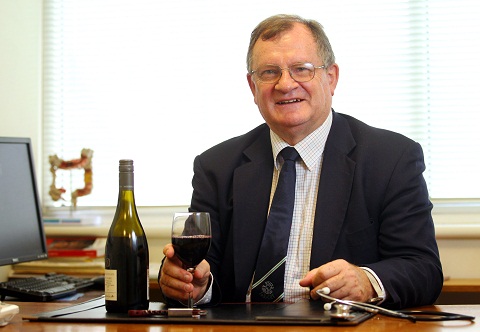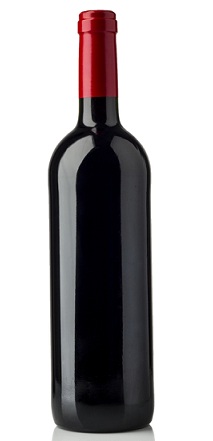
Professor FINLAY MACRAE, who sees potential in a glass or two of red wine beyond fine dining. PIC: Mark Stewart/Leader Newspapers
Professor Macrae, who is head of the Department of Colorectal Medicine and Genetics at the Royal Melbourne Hospital, leads a team of researchers who are dedicated to finding and preventing the causes of bowel cancer, which kills nearly 5000 Australians each year.
“This makes it the second highest cause of death amongst Australians living with cancer,” he notes.
At present, the researchers are running pre-clinical trials on people with either a family history of bowel cancer or a personal history of bowel cancer or polyps – small nodules that may lead to cancer.
“Assuming we are successful, these trials will give us the first true evidence that the anti-cancer properties of resveratrol are active in humans.” — Professor Finlay Macrae
The team is investigating the effects of resveratrol – a polyphenolic compound found in red wine – on the lining of the bowel. They hope to find evidence that resveratrol not only slows the reproductive rate of cancer-bearing cells in the bowel, but also prevents the growth of polyps.
Two years into the $575,000 trial, Professor Macrae says preliminary research has shown that resveratrol has significant anti-cancer effects on cancer cell lines – long-lived, human cancer cells grown in a laboratory. Similar findings were seen in animal models, where the compound prevented the onset of bowel cancer.
“What we hope to do is shift a person’s bowel profile from one of high risk to one of low risk,” says Professor Macrae. “Assuming we are successful, these trials will give us the first true evidence that the anti-cancer properties of resveratrol are active in humans.”
Resveratrol is a compound primarily found in red grape skins, berries, peanuts and chocolate. It is part of a group of organic substances known to colorectal scientists as bioactives – plant or animal extracts thought to enhance the disease-resistant properties of the bowel.
While research tends to focus on mimicking the properties of bioactives for use in humans, Associate Professor Geoff Scollary, of the University of Melbourne’s School of Chemistry, says resveratrol acts in a similar way in both plants and animals.
“When a plant is under environmental or physical stress, it produces defence chemicals such as resveratrol to try to restore its natural growth. This is similar to the way animals produce white blood cells to combat diseases caused by bacteria and viruses.”
Research into resveratrol began in earnest after a 2006 study reported that obese mice fed a diet supplemented with the compound lived 15 per cent longer than mice with a healthy bodyweight.
The study found resveratrol activated a group of compounds called sirtuins – proteins thought to slow the onset of age-related diseases. But the findings were disputed by other research teams.
Further claims of medical breakthroughs involving resveratrol have since emerged, but Professor Scollary remains sceptical. “Some of this research has never been independently validated,” he says.
Research from the University of Leeds suggested purified extracts of EGCG – a chemical found in resveratrol and green tea – could prevent nerve cell damage caused by Alzheimer’s disease.
“When a plant is under environmental or physical stress, it produces defence chemicals such as resveratrol to try to restore its natural growth. This is similar to the way animals produce white blood cells to combat diseases caused by bacteria and viruses.” — Associate Professor Geoff Scollary
Similar findings came from investigations into heart disease, diabetes and memory loss.
But researchers from the University of Copenhagen have claimed that resveratrol is not always beneficial. While the compound appeared to boost the effects of cardiovascular exercise in animal models, these effects were greatly reduced in men aged over 60. Resveratrol, the researchers believe, counteracts the benefits of exercise.
Disputing this finding is a 2013 study from the Harvard Medical School. Lead scientist Professor David Sinclair claims he has invented a resveratrol-based “super drug” that can prevent cancer and other age-related diseases by mimicking the effects of a healthy diet and exercise. He also claims the drug has the potential to help people live in good health until the age of 150.
While publicising his research, Professor Sinclair said resveratrol activated the body’s genetic defences against ageing and disease, making the compound “more effective than any anti-oxidant”.
Professor Sinclair’s claims, though, are questionable and his reputation somewhat tarnished. Last year, he was caught lying to the New York Times after downplaying his connections to Dr Dipak Das, a disgraced resveratrol researcher who was found to have falsified, fabricated and manipulated scientific data on at least 145 occasions.
Another concern when considering the potential health benefits of red wine is that the concentration of resveratrol in red wine is nowhere near the levels used in scientific research.
“To see any of the claimed anti-ageing benefits linked to resveratrol, you would need to drink at least 100 glasses of red wine every day,” says Professor Scollary, a former director of the National Wine and Grape Industry Centre at Charles Sturt University. “That much alcohol is enough to destroy a human liver.”
While alcohol is toxic to humans, researchers believe high concentrations of resveratrol should be well tolerated by humans. But with little scientific research in this area, such claims are speculative.
“The only way to get such an effective concentration of resveratrol would be to use artificial supplements,” Professor Scollary says. “But resveratrol is not a natural part of the human diet, so we have no way of knowing what effects repeated doses would have on our health and metabolism.”
Professor Scollary’s comments reflect a recurring problem in resveratrol research. Humans respond in very different ways to the animal models and cell lines often studied in research projects.
“Simply relating such research directly to humans not only ignores the complexity of human biology, but also requires a huge leap of faith,” Professor Scollary says.
Professor Macrae agrees: “Claims of resveratrol minimising the effects of ageing have become embedded in scientific literature. While animal studies may suggest that resveratrol can influence ageing, there is no strong evidence of this effect.”

It’s also worth noting that resveratrol is not needed to produce many of the anti-ageing effects claimed by scientists. It is not even needed to activate the sirtuin protein. Humans can naturally slow the ageing process by eating fewer processed foods and increasing daily exercise.
While concerns such as these raise questions about the integrity of resveratrol research, scientists such as Professor Sinclair remain committed to harnessing the compound’s potential. Indeed, an entire industry has developed around resveratrol.
In 2004 a group of resveratrol advocates, including Professor Sinclair, founded the biotechnology company, Sirtris Pharmaceuticals. Just four years later, in 2008, the company – and all of its research – was bought by GlaxoSmithKline for $US720 million ($A788.5 million).
Manufacturers of dietary supplements then began capitalising on the popularity of resveratrol, selling the compound to customers over the counter. At the same time, cosmetics brands such as Estée Lauder and Caudalie began blending resveratrol into everything from lipsticks to skin tighteners. And all of sudden, the market was flooded with products that could apparently reduce wrinkles and make skin look visibly younger.
With conflicting scientific claims on one side and marketing hype on the other, the truth about resveratrol is difficult to find. But hidden beneath the turmoil is a simple contention: resveratrol has potential.
Professor Macrae, for instance, is investigating the effects that resveratrol may have on the molecular lining – or profile – of the bowel.
A bowel profile is a measure of health and function inside the bowel. And, according to Professor Macrae, humans are born with one of two profile types: a high-risk profile, which has a reduced protection against cancer, or a low-risk profile, in which the bowel itself actively takes measures to prevent abnormal growths.
Professor Macrae believes resveratrol has the potential to help the bowel remove abnormal cells from the colon.
While success is not guaranteed, Professor Macrae is optimistic. He emphasises a link between the higher levels of resveratrol in the traditional foods and wine of the southern Mediterranean diet and the low incidence of bowel cancer in the region.
“It seems likely that resveratrol is contributing to this trend,” he says.
Professor Macrae is seeking adults with a family history of bowel cancer or a personal history of bowel cancer or polyps to participate in his research. For more information, contact Virginia Bird at the Royal Melbourne Hospital on (03) 9342 3995.



